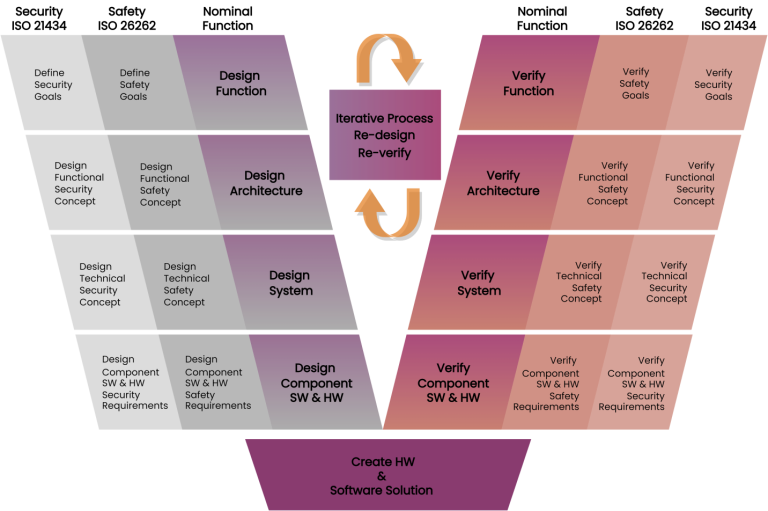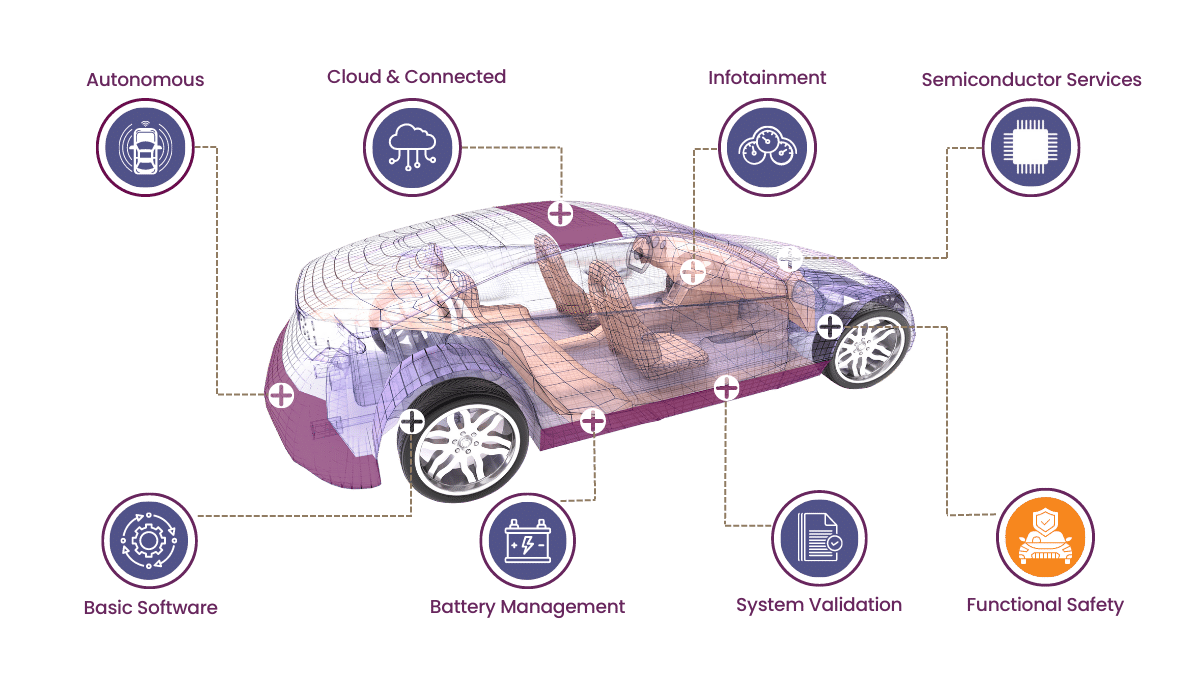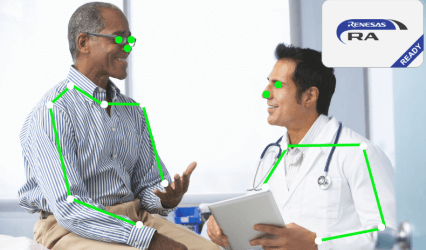AUTOMOTIVE FUNCTIONAL SAFETY
Cruise along into the future of mobility
Building next-gen, AI-enabled, high-compute SoCs along with complex software stacks for Software-Defined Mobility systems that prioritize Automotive Functional Safety at every stage of development, by leveraging our extensive experience in Semiconductor design, Embedded systems, Digital Software, and Automotive Functional Safety methodologies.
How Can Ignitarium Help You Ensure Functional Safety?

Ignitarium plays a pivotal role in helping companies meet Automotive Functional Safety requirements by offering end-to-end services aligned with industry standards such as ISO 26262 and IEC 61508. With deep domain expertise and TUV-certified professionals, Ignitarium supports the complete Functional Safety lifecycle, from concept to production.
Their Automotive Functional Safety offerings include:
• SoC and Software Consulting
• Gap Analysis
• Pilot Functional Safety Projects
• Functional Safety Implementation
Ignitarium combines technical excellence in semiconductors, embedded software, and automotive domain expertise to build systems that are not only compliant but optimized for safety-critical performance. By adopting structured processes, reusable safety assets, and a rigorous validation framework, Ignitarium ensures that your automotive systems meet the highest standards of Automotive Functional Safety, reducing risk, ensuring reliability, and accelerating certification timelines.
ISO9001 Company specialized in IEC 61508 and ISO 26262a standards
Functional safety-compliant hardware and software development processes
Enabling customer products up to ASIL-D and SIL-3 systems
TUV certified FUSA experts on Hardware and Software

What we offer:
SoC & Software Consulting:
- Architecture consulting for automotive designs
- Functional Safety Architecture & implementation
- Work products for ASIL certification
Gap Analysis:
- Identify the gaps in hardware and software modules
- Review documents and process followed
Pilot Functional Safety Projects:
- Modify the implementations based on the identified gaps
- Create work products to prove compliance
Functional Safety implementations:
- Identify relevant work products for the project
- Rework content and the process to make the modules or libraries Functional Safety compliant

Conceptual Design
- Software, IP & SoC Design compliant to ISO26262
- Hazard Analysis & Risk Assessment
- Safety Goals
- HARA Report .

Analysis
- FMEA & FMEDA
- Fault Tree Analysis
- Fault Insertion Tests
- Safety Analysis
- Interference Freeness, Dependent Failures and Common Cause Failure (CCF)

Verification & Validation
- Safety Test Cases development
- Error Injection
- Safety Validation Testing
- Safety Compliance
- Safety Report

Tools



















AUTOMOTIVE
FuSa Qualification of an Automotive SoC
Learn More

AUTOMOTIVE
Development of an Automotive SoC
Learn More
Hardware Platforms





Autosar


Model based design


Testing



Compliance


OS




Automotive Functional Safety refers to the systematic approach to ensuring that safety-critical systems within vehicles operate reliably and mitigate the risk of hazards, such as accidents or malfunctions. It is crucial for safeguarding the wellbeing of passengers, pedestrians, and other road users.
Automotive Functional Safety is guided by principles outlined in standards such as ISO 26262, which define requirements for the development and management of safety-critical systems in automobiles. These principles include hazard analysis and risk assessment, safety goals definition, safety mechanisms implementation, and continuous monitoring and improvement.
While conventional automotive safety measures focus on passive systems such as airbags and seat belts, Functional Safety addresses the proactive design and implementation of electronic and software-based systems to prevent or mitigate hazards. It emphasizes the systematic identification and management of safety risks throughout the vehicle’s lifecycle.
Standards like ISO 26262 provide a framework for achieving Automotive Functional Safety by specifying requirements and guidelines for the development, implementation, and validation of safety-critical systems in vehicles. Compliance with these standards ensures that automotive manufacturers adhere to best practices and industry regulations.
Companies can ensure compliance by establishing robust processes and methodologies for Functional Safety management, conducting comprehensive risk assessments and safety analyses, implementing appropriate safety measures and mechanisms, and documenting evidence of compliance throughout the development lifecycle. Additionally, training and certification programs help ensure that personnel have the necessary skills and knowledge to adhere to safety standards effectively.
Working with a trusted Engineering R&D services partner like Ignitarium can offload the entire Functional Safety compliance workload from companies.

































